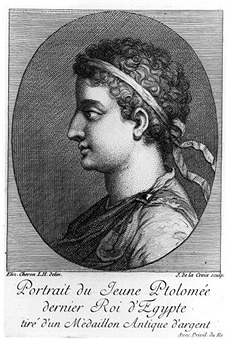
The 1st century BC, also known as the last century BC and the last century BCE, started on the first day of 100 BC and ended on the last day of 1 BC. The AD/BC notation does not use a year zero; however, astronomical year numbering does use a zero, as well as a minus sign, so "2 BC" is equal to "year –1". 1st century AD follows.
Year 48 BC was a year of the pre-Julian Roman calendar. At the time, it was known as the Year of the Consulship of Caesar and Vatia. The denomination 48 BC for this year has been used since the early medieval period, when the Anno Domini calendar era became the prevalent method in Europe for naming years.
This article concerns the period 39 BC – 30 BC.

This article concerns the period 49 BC – 40 BC.
This article concerns the period 69 BC – 60 BC.
Year 67 BC was a year of the pre-Julian Roman calendar. At the time it was known as the Year of the Consulship of Piso and Glabrio. The denomination 67 BC for this year has been used since the early medieval period, when the Anno Domini calendar era became the prevalent method in Europe for naming years.
Year 30 BC was either a common year starting on Wednesday, Thursday or Friday or a leap year starting on Thursday of the Julian calendar and a common year starting on Wednesday of the Proleptic Julian calendar. At the time, it was known as the Year of the Consulship of Octavian and Crassus. The denomination 30 BC for this year has been used since the early medieval period, when the Anno Domini calendar era became the prevalent method in Europe for naming years.

Cleopatra VII Thea Philopator was Queen of the Ptolemaic Kingdom of Egypt from 51 to 30 BC, and its last active ruler. A member of the Ptolemaic dynasty, she was a descendant of its founder Ptolemy I Soter, a Macedonian Greek general and companion of Alexander the Great. After the death of Cleopatra, Egypt became a province of the Roman Empire, marking the end of the last Hellenistic-period state in the Mediterranean and of the age that had lasted since the reign of Alexander. Her first language was Koine Greek, and she was the only known Ptolemaic ruler to learn the Egyptian language.

Ptolemy XIII Theos Philopator was Pharaoh of Egypt from 51 to 47 BC, and one of the last members of the Ptolemaic dynasty. He was the son of Ptolemy XII and the brother of and co-ruler with Cleopatra VII. Cleopatra's exit from Egypt caused a civil war to break out between the pharaohs. Ptolemy later ruled jointly with his other sister, Arsinoe IV.
Berenice IV Epiphaneia was a Greek princess and Queen of the Ptolemaic dynasty. From 58 to 55 BC, Berenice IV ruled Egypt during the political exile of her father Ptolemy XII Auletes to Rome. It is unclear if she was co-ruler of Egypt with her mother Cleopatra V or a possible sibling Cleopatra VI from 58 to 57 BC, but became sole ruler in 57 BC. On the return of Ptolemy XII to Egypt with Roman military aid and an army led by Aulus Gabinius, Berenice IV was overthrown and executed by her rival father, who later bequeathed his throne to his daughter Cleopatra VII and son Ptolemy XIII as co-rulers.

Pharnaces II of Pontus was the king of the Bosporan Kingdom and Kingdom of Pontus until his death. He was a monarch of Persian and Greek ancestry. He was the youngest child born to King Mithridates VI of Pontus from his first wife, his sister Queen Laodice. He was born and raised in the Kingdom of Pontus and was the namesake of his late double great grandfather Pharnaces I of Pontus. After his father was defeated by the Romans in the Third Mithridatic War and died in 63 BC, the Romans annexed the western part of Pontus, merged it with the former Kingdom of Bithynia and formed the Roman province of Bithynia and Pontus. The eastern part of Pontus remained under the rule of Pharnaces as a client kingdom until his death.

The Battle of Zela was fought in 47 BC between Julius Caesar and Pharnaces II of the Kingdom of Pontus. The battle took place near Zela, which is now a small hilltop town in the Tokat province of northern Turkey. The battle ended the ambitions of king Pharnaces who wanted to expand his rule over Asia-Minor.

The Battle of the Nile in early 47 BC saw the combined Roman–Egyptian armies of Julius Caesar and Cleopatra VII defeat those of the rival Queen Arsinoe IV and King Ptolemy XIII and secure the throne of Egypt.

Cleopatra is a 1999 miniseries adaptation of Margaret George's 1997 historical fiction novel The Memoirs of Cleopatra. Produced by Hallmark Entertainment, it stars Leonor Varela as the Egyptian queen Cleopatra, Timothy Dalton as Julius Caesar, Billy Zane as Mark Antony, Rupert Graves as Octavius, Sean Pertwee as Brutus and Bruce Payne as Cassius. Cleopatra was shown first on the ABC television network in two parts on two consecutive evenings in May 1999 and then released on videotape and DVD. Judy Farr, Martin Hitchcock and Frank Walsh were nominated for an Emmy in 1999 for outstanding art direction for a miniseries or a movie for their work on Cleopatra.

The Ptolemaic Kingdom or Ptolemaic Empire was an Ancient Greek state based in Egypt during the Hellenistic period. It was founded in 305 BC by the Macedonian general Ptolemy I Soter, a companion of Alexander the Great, and ruled by the Ptolemaic dynasty until the death of Cleopatra VII in 30 BC. Reigning for nearly three centuries, the Ptolemies were the longest and final dynasty of ancient Egypt heralding a distinctly new era for religious syncretism and the blending of a new Greco-Egyptian culture.

Cappadocia was a province of the Roman Empire in Anatolia, with its capital at Caesarea. It was established in 17 AD by the Emperor Tiberius, following the death of Cappadocia's last king, Archelaus.

Bithynia and Pontus was the name of a province of the Roman Empire on the Black Sea coast of Anatolia. It was formed during the late Roman Republic by the amalgamation of the former kingdoms of Bithynia and Pontus. The amalgamation was part of a wider conquest of Anatolia and its reduction to Roman provinces.

The military campaigns of Julius Caesar constituted both the Gallic Wars and Caesar's civil war. The Gallic War mainly took place in what is now France. In 55 and 54 BC, he invaded Britain, although he made little headway. The Gallic War ended with complete Roman victory at the Battle of Alesia. This was followed by the civil war, during which time Caesar chased his rivals to Greece, decisively defeating them there. He then went to Egypt, where he defeated the Egyptian pharaoh and put Cleopatra on the throne. He then finished off his Roman opponents in Africa and Hispania. Once his campaigns were over, he served as Roman dictator until his assassination on 15 March 44 BC. These wars were critically important in the transition of the Roman Republic into the Roman Empire.
The siege of Corduba was an engagement near the end of Caesar's Civil War, in which Julius Caesar had besieged the city of Corduba after Sextus Pompey, Son of Pompey Magnus had fled the city leaving Annio Scapula in charge. Caesar stormed the city and 22,000 people died.
The Siege of Apamea was a failed attempt by the Caesarians near the end of Caesar's Civil War to capture the rebel city of Apamea, Syria Secunda. Lucius Statius Murcus and Quintus Marcius Crispus led the attempt to capture the city, while Equite Quintus Caecilius Bassus led the defence of the city.











